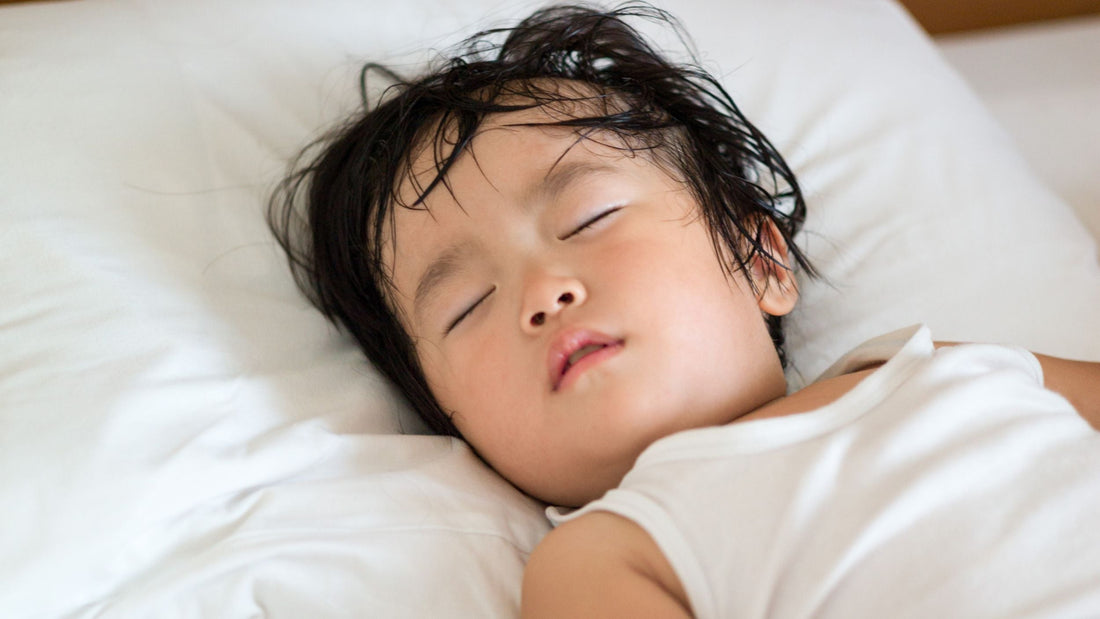A peaceful night's sleep is essential for your child's well-being, but what happens when they wake up drenched in sweat? Night sweats in kids can be concerning, leaving parents searching for answers.
This blog will explore the symptoms, causes, and solutions for night sweats in children. From common triggers to when it's time to consult a doctor, we've covered your child's comfort and health.
What Are Night Sweats?
Night sweats, also known as nocturnal hyperhidrosis, refer to excessive sweating at night, mainly while a person is asleep. This condition can lead to damp bedding, clothing, and discomfort. Night sweats can vary in severity, from mild to profuse sweating, and they can be associated with various underlying causes, including medical conditions, medications, environmental factors, or hormonal changes.
Night sweats differ from normal perspiration during sleep due to a warm room or heavy blankets. They typically involve excessive and unexpected sweating that may soak through clothing and bedding, causing discomfort and disruption to sleep.

Common Symptoms & Causes of Night Sweats in Kids
Symptoms:
- Local Sweating: Your child's night sweats may be concentrated in specific areas, such as the head, neck, or chest.
- General Sweating: Children may sometimes experience overall body sweating, leading to soaked pajamas and sheets.
Additional symptoms to look out for if your child is experiencing severe night sweats:
- Fever
- Cough
- Diarrhea
- Weight loss
- Flu-like symptoms
- Loss of appetite
- Fatigue
- Nose bleeds
- Bone pain
- Swollen lymph nodes
Causes:
Night Terrors
Night terrors are instances of intense fear, screaming, and sudden waking from sleep, often accompanied by profuse sweating. These episodes can trigger night sweats in children. Night terrors are most common in young children and typically occur during sleep's non-REM (rapid eye movement) stage.
Obstructive Sleep Apnea Syndrome (OSAS)
Obstructive Sleep Apnea Syndrome is a type of sleep disorder with repeated interruptions in breathing during sleep. This may lead to disturbed sleep patterns and oxygen deprivation, causing night sweats in children. OSAS may be associated with other symptoms such as snoring, gasping for breath, and daytime sleepiness.
Hyperhidrosis
Hyperhidrosis is a condition with excessive sweating beyond what is necessary to regulate body temperature. Some children may have hyperhidrosis, which can lead to profuse sweating, including night sweats. It's critical to consult a healthcare provider if hyperhidrosis is suspected, as it may require treatment or management.
Cancer
According to the National Cancer Institute, cancer may occasionally result in night sweats. In some cases, night sweats related to cancer may present with additional symptoms, including unexplained weight loss, persistent fatigue, or a fever. Consult a pediatrician if cancer is suspected, as early diagnosis and treatment are essential for favorable outcomes.
Hypoglycemia
Hypoglycemia (low blood sugar) can lead to night sweats in children. When blood sugar levels drop significantly during sleep, the body may respond by sweating excessively. Monitoring a child's blood sugar levels, especially if they have diabetes or other conditions that affect glucose regulation, is essential to prevent hypoglycemia-related night sweats.
Medications
Some medications can have night sweats as a side effect, particularly in children. If a child is taking medications and experiences night sweats, it's essential to discuss this with their healthcare provider. Adjusting the medication or exploring alternative treatments may alleviate this side effect.

Solutions for Night Sweats in Kids
In most cases, your child may not require any specific treatment. Occasional or regular sweating during sleep is common in many children, particularly boys.
Consider the following measures to enhance your child's comfort:
- Opt for more breathable and lightweight pajamas for your child.
- Choose lighter bedding options.
- Adjust the room temperature by lowering the heating at night.
If an underlying health condition, such as a cold or flu, contributes to the night sweats, the sweating will likely subside once your child recovers.
Your child's pediatrician may conduct sweat tests to exclude the possibility of other conditions. These are painless tests and can be performed during a visit to the doctor's office. They may include the following:
- Starch Iodine Test - This test can help identify areas of excessive sweating and may guide treatment.
- Paper Test - Placing special paper on your child's skin at night can help determine the extent and pattern of sweating.
When to See a Doctor
While occasional night sweats are harmless, a healthcare professional should evaluate persistent or severe sweating. Consult a doctor if other concerning symptoms accompany night sweats or affect your child's overall well-being.
Understanding the causes and solutions for night sweats in kids is essential for ensuring their comfort and health. While many cases are benign and related to environmental factors, monitoring your child's condition and seeking medical advice when needed is crucial.
By addressing the root causes and delivering suitable care, you can assist your child in achieving a more comfortable and restful sleep.
FAQs about Kids Night Sweats
- Is it normal for kids to have night sweats?
- Occasional night sweats can be regular, especially in warm weather. However, persistent or severe night sweats may indicate an underlying issue.
- What can I do to alleviate my child's night sweats?
- Ensure a comfortable sleep environment, maintain an appropriate room temperature, and choose breathable bedding. If night sweats persist, consult a doctor.
- Are night sweats in kids a sign of a severe medical condition?
- In most cases, night sweats in children are not a cause for alarm and may be linked to environmental factors. However, consult a doctor as you see fit.

